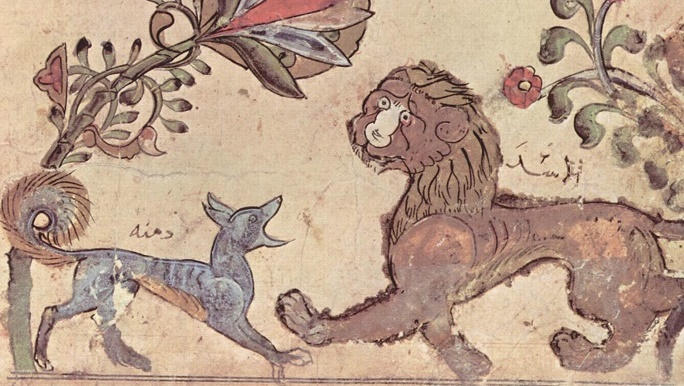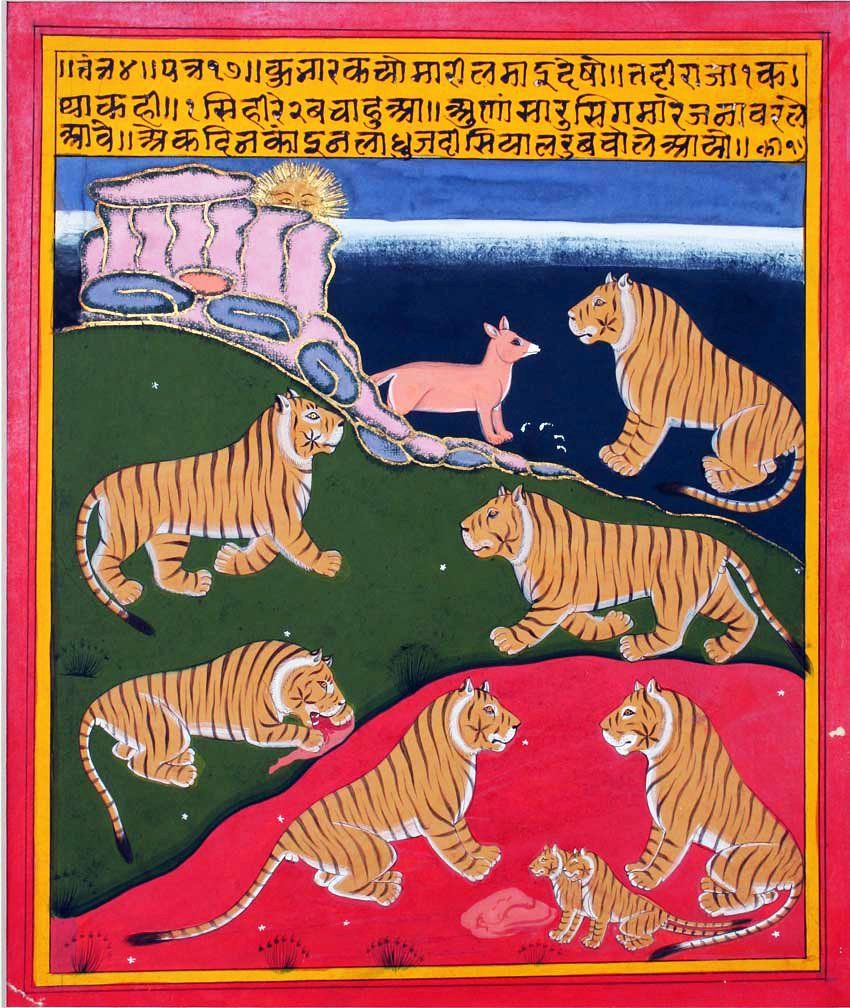वर्धमानो महान् स्नेहः सिंह-गो-वृषयोर् वने ।
पिशुनेनातिलुब्धेन जम्बुकेन विनाशितः ॥ १ ॥
vardhamāno mahān snehaḥ siṃha-go-vṛṣayor vane |
piśunenātilubdhena jambukena vināśitaḥ || 1 ||
The increasing true friendship between the lion and the bull in the forestwas destroyed by a deceitful greedy fox.

Long, long ago, a merchant named Vardhamānaka (he who is prosperous) lived in a town in the south of India. As he rested on his bed one day, it struck him that money was the axis of the world and that the more he had of it, the more he would be powerful.
इह लोके हि धनिनां परो ऽपि स्वजनायते ।
स्वजनो ऽपि दरिद्राणां सर्वदा दुर्जनायते ॥ ५ ॥
iha loke hi dhanināṃ paro ‘pi svajanāyate |
svajano ‘pi daridrāṇāṃ sarvadā durjanāyate || 5 ||
In this world,even the enemy of a wealthy man gets honored. Even the acquaintance of a poor man is always treated as a wicked person.
Even enemies seek the friendship of a rich man, he told himself.
The old become young if they have riches and the young become old if they do not have wealth. Business is one of the six ways that help man amass wealth. So I should get into business!
Having decided this, he collected some goods to be sold in Mathura and on an auspicious day, taking the blessings of his elders, sat on a good cart and began his journey.
Two auspicious bulls named Sanjeevaka (one who is lively) and Nandaka (one who is joyful) who were born in his house and bred there, had been yoked to the cart to pull it along the road. Of the two, Sanjeevaka climbed down towards the bank of the River Yamuna and slipped in the wet sand; he broke the yoke and sat down. Vardhamānaka felt distressed seeing the condition of his pet bull. He even stopped there for three days waiting for the bull to recover.
Observing his sad state, his co-travelers said to him, “O rich man! How can you jeopardize the lives of all of us by making us all wait here in this dangerous forest filled with lions and tigers? It is said-
न स्वल्पस्य कृते भूरि नाशयेन् मतिमान् नरः ।
एतद् एवात्र पाण्डित्यं यत् स्वल्पाद् भूरि-रक्षणम् ॥ १९ ॥
na svalpasya kṛte bhūri nāśayen matimān naraḥ |
etad evātra pāṇḍityaṃ yat svalpād bhūri-rakṣaṇam || 19 ||
An intelligent man does not destroy much for the sake of less. If he can lose only a little and save much,then that is the sign of his intelligence.”
Vardhamānaka relented. He instructed a few of his men to care of the bull and continued the journey with his fellow travelers. Those men in turn felt the forest to be too dangerous to remain alone for a long time. They left the bull there and quickly went back to join the merchant caravan. They lied to their master-“Master, poor Sanjeevaka is dead. We cremated him in the fire as we felt that would have been your wish.”
Hearing their words Vardhamānaka felt grateful towards them for their kind act. Emotionally moved by the bull’s death, he performed all the necessary rites connected to the death of the bull.

But Sanjeevaka had much more to do in this life – it wasn’t time for him to go. Revived by the cool moist winds blowing from the river, he stood up with all effort that he could muster and reached the bank of the river. Eating the tender grass shoots there, he regained his strength, and within a few days he shone like Nandi, the bull of Shiva. Everyday he broke the anthills around there with his horns and roared aloud. It is well-said,
अरक्षितं तिष्ठति देव-रक्षितं सुरक्षितं देव-हतं विनश्यति ।
जीवत्य् अनाथो ऽपि वने विसर्जितः कृत-प्रयत्नो ऽपि गृहे विनश्यति ॥ २० ॥
arakṣitaṃ tiṣṭhati deva-rakṣitaṃ surakṣitaṃ deva-hataṃ vinaśyati |
jīvaty anātho ‘pi vane visarjitaḥ kṛta-prayatno ‘pi gṛhe vinaśyati || 20 ||
That which is un-protected remains protected by the unseen fate.That which is protected perishes when the fate is against it. Even an orphan lives left in a forest.Even with no effort spared, one in the house dies.
After a few days, a lion named Pingalaka (the one who is golden–coloured, and royal) came to the banks of Yamuna to drink water and ease his thirst, surrounded by all its followers. He heard the loud deep roaring sound of Sanjeevaka from afar. Hearing that sound, he felt very anxious. Frightened, he hid himself under a fig tree, making a protective circle of four sections.
{The king stays in the innermost circle; his trustworthy ministers and subordinates in the next circle; the third circle is occupied by soldiers. The outermost ring contains the spies and guards.}
Also present were two foxes named Karataka and Damanaka, the sons of the minister. All they did was to follow the king and try to win his favor. They discussed the situation with each other.
Damanaka said- “My good friend Karataka! Our master came down the river bank to drink water. But now he is in hiding! For what reason has he not ventured to quench his thirst, and why is he acting distressed?”
Karataka said-“O good Damanaka! What does it matter to us? It is said-
अव्यापरेषु व्यापारं यो नरः कर्तुम् इच्छति ।
स एव निधनं याति कीलोत्पाटीव वानरः ॥ २१ ॥
avyāpareṣu vyāpāraṃ yo naraḥ kartum icchati |
sa eva nidhanaṃ yāti kīlotpāṭīva vānaraḥ || 21 ||
That man who wants to engage in doing something which is not at all connected to him will indeed die like the monkey which removed the wedge.”
“Sounds interesting. Why don’t you tell me what happened to the monkey,” pleaded Damanaka. “Now, listen,” said Karataka and began narrating the story of the monkey…
to be continued…
Karataka and Damanka are the two foxes and central characters in the Mitra-bheda book of the Panchatantra.
Damanaka means the one who subdues or conquers. Karataka literally means a crow – crows are usually depicted as wise, cautious, flying away the moment they perceive danger. So Karataka can mean the one who is cautious or prudent, as opposed to Damanaka’s character who takes risks.

Pingback: The debate… – Shihan Rohit Ghai
Pingback: The debate continues… – Shihan Rohit Ghai